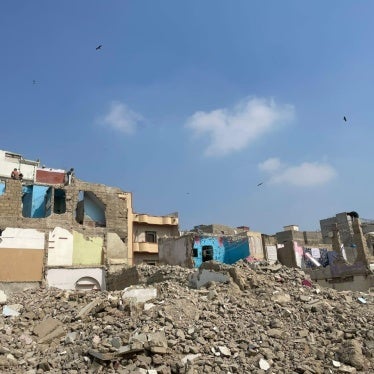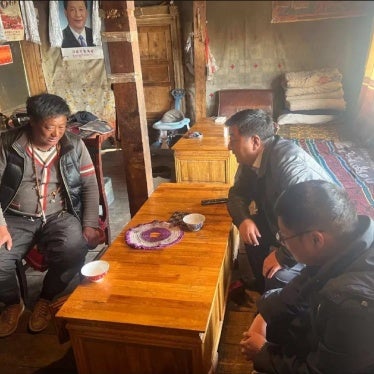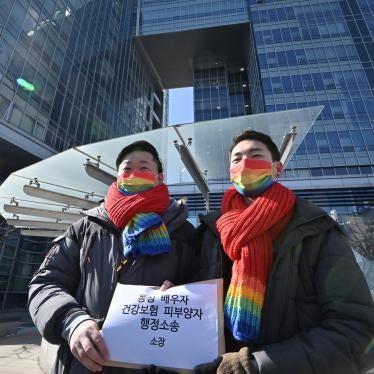Human Rights Watch today called on Cambodia's international donors to put human rights high on the agenda during the Consultative Group on Cambodia (CG) convened by the World Bank, scheduled for May 24-26 in Paris. Prime Minister Hun Sen will participate in the meeting.
"Donors are one of the most important sources of pressure we have on Cambodia," said Mike Jendrzejczyk, Washington director of Human Rights Watch. Jendrzejczyk also urged the donor governments to press the government to fully comply with international standards in its negotiations with the U.N. on the creation of a tribunal for leaders of the Khmer Rouge.
Human Rights Watch continues to strongly favor unconditional -- and increased -- funding and other assistance for humanitarian, human rights, and democracy-building projects through nongovernmental organizations (NGOs) in Cambodia.
However, the rights organization strongly urged both bilateral and multilateral donors -- including the World Bank and Asian Development Bank -- to strictly condition any direct assistance to the Cambodian government on its demonstrable progress in prosecuting human rights abusers, strengthening the rule of law, implementing judicial reforms, initiating anti-corruption measures, and bringing Khmer Rouge leaders to justice.
Human Rights Watch also called on donors in Paris to establish an official working group on human rights and rule of law. "So far, only an informal donor group has met to discuss issues of good governance and rule of law," said Jendrzejczyk. "In order to establish clear benchmarks and mark the Cambodian government's progress, donors should set up an official human rights working group. This should be a major priority for the CG."
At this year's CG meeting the Cambodian government is expecting pledges of U.S. $500 million in aid, an increase from the $470 million aid package pledged at the last donors' conference in February 1999 in Tokyo.
Among the recommendations that Human Rights Watch urges donors to raise with the government at the CG meeting are:
Steps to end impunity: Depoliticize the Supreme Council of Magistracy and the Supreme Court, pass critically-needed laws including a new law on criminal procedure and a new criminal code, enact legal prohibitions against out-of-court financial compensation for major criminal offenses, and conduct independent judicial inquiries about police actions that involve death or injury to suspects.
Addressing Corruption: Press for increases in salaries of government officials, advocate for the periodic rotation of police and court personnel to different departments or geographical locations, and insist that the SCM Disciplinary Council discipline or dismiss court officials for failure to prosecute cases and for law enforcement officials to be disciplined for failure to investigate and report on cases.
Protecting Political Rights and Freedom of Association: Provide funding and speak up in defense of Cambodia' s domestic human rights monitors, as well as the Cambodia Office of the High Commissioner for Human Rights; press the Cambodian government to insure the rights of all persons, regardless of political affiliation, to free assembly and membership in political parties of their choice; and insist that the government bring to justice perpetrators of violence and intimidation against human rights workers and individuals expressing peaceful political opinions.
Preparing Free and Fair Commune Elections: Insist that the government set clear benchmarks for electoral reform in advance of the commune elections, including reformulating the National Election Commission as a neutral and non-partisan body, providing equal access to the media to candidates, and providing for adequate numbers of trained local and international observers. Take immediate steps to disarm and dismantle the commune militias and dissolve the People's Protection Units, which could be used to implement political violence by the ruling party. Encourage the government to pass a Commune Election Law in which candidates would run on an individual basis and not as political party member, in order to reduce political violence.
Bringing the Khmer Rouge to Justice: Donors should express their support for the U.N.'s role in any international tribunal of the Khmer Rouge and make clear to Prime Minister Hun Sen that they will not provide funding, technical assistance, judges, or other support until minimum standards of justice are guaranteed. The U.N. Secretary-General must be empowered to approve all judges and prosecutors who participate in the tribunal, the majority of whom should be non-Cambodians. The proposed arbitration panel to settle conflicts between co-prosecutors should be abandoned and prosecutors given independent authority to indict. Rules of procedure should be patterned on the rules and statutes of the international tribunals for former Yugoslavia and Rwanda, and other relevant international treaties. The law should include a well-conceived protection plan -- under the auspices of the U.N. -- to ensure that witnesses and all participants in the process have adequate guarantees for their personal security.






